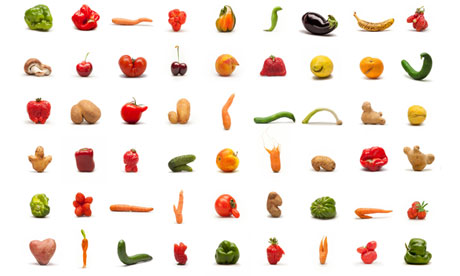
When Lea Brumsack and Tanja Krakowski prepare gourmet meals for their growing Berlin catering business, they go for ugly. Ugly fruit and vegetables, that is. After all, their company's mission is to save misshapen produce – by showing customers they're an attractive choice.
"We don't present the vegetables as waste, because they're not waste," Brumsack tells Guardian Sustainable Business. "It's good food that's even more interesting because it doesn't exist in the usual supermarket and restaurant range. These vegetables are more like pieces of art."
Worldwide, almost 40% of fruit and vegetables will go to waste before they even reach consumers, according to figures from the UN Food and Agricultural Organisation (FAO). In some parts of the world, that's because there are no efficient means of storing it. In Europe, the reasons are primarily cosmetic. The Soil Association calculates that in the UK, 20-40% of produce is rejected because it's misshapen.
That's a problem, and not just because it's wasteful. According to Wrap, the sustainability agency, each year 90,000 tonnes of produce in the UK alone is sent to landfill, where it rots and emits methane into the atmosphere. Wasted food also uses scarce water and land resources. Besides, a quickly growing world population needs the food. The FAO estimates that by 2050 global food production must increase by 70%.
Brumsack and Krakowski's business, Culinary Misfits, is part of a new trend to utilise the misshapen produce. Three other young Germans have hit international headlines with their campaign Ugly Fruits, which uses suggestive slogans to attract consumers to rejected greens.
"Not eating food that has been produced is unsustainable," observes co-founder Daniel Plath. "And it's a huge waste of energy in agriculture to grow food that's thrown away."
In the UK, Feeding the 5000 runs a national gleaning network, whose members harvest misshapen produce and donate it to charity. Earlier this summer, they rescued 11,000 cauliflowers from landfill. And in America, the Society of St Andrew, together with local farmers, run a growing operation saving wonky produce.
But, as Culinary Misfits shows, there's a business case for ugly veggies. Ugly Fruits' business plan, which envisages trendy shops selling exclusively misshapen fruit, has already attracted proposals from potential partners. They developed the concept after failed attempts to convince supermarket chains to sell ugly produce.
"They told us customers don't want ugly fruit, but that's because customers are not familiar with it," explains Moritz Glück, another co-founder. "Of course people buy regular produce because that's what they see on ads and posters. But we're already getting emails asking when our first shop is opening."
According to a poll by the Institute of Mechanical Engineers, 45% of Brits say the appearance of fruit and vegetables doesn't matter. Some 26% would buy the cheapest option, and 10% say they would actively choose imperfect produce.
Indeed, when catering meals for corporations in the Berlin area, Brumsack and Krawkowski find customers remarkably receptive. "In terms of taste, ugly vegetables are just as good as regular vegetables," explains Brumsack. "But the point is that you reach people through an aesthetic presentation, not by saying, 'you're so bad, you waste food'."
According to Stacey Hunslow of the Sustainability Institute at the University of New Hampshire, "restaurants would use the imperfect fruits and vegetables because rarely are they used whole anyway."
Though primarily for pricing reasons, supermarkets are catching on to the trend, too. "They previously assumed that people wouldn't buy misshapen produce", reports Martin Bowman, a co-ordinator at Feeding the 5000. "But wonky fruit and veg are now one of the fastest-growing value [low-price] ranges in supermarkets."
Last year, with farmers facing poor crops, Sainsbury's sold produce of all appearances, though spokeswoman Josephine Simmons tells Guardian Sustainable Business that "there hasn't been the need" to do so this year. Sainsbury's declined to release sales figures, but according to the Centre for Retail Research, sales of environmentally sustainable products are growing, while organic purchases are falling.
Perhaps most importantly, the EU now supports wonky produce. The 1994 European Commission regulation that banned over-bendy bananas led to widespread ridicule (and waste) and in 2008, member states agreed to allow both bendy bananas and other misshapen produce. The top 10 fruits and vegetables are now sold without cosmetic restrictions.
"Buying wonky fruit is a shopping experience, and people know they're doing something good in the process. And imagine the advertising possibilities", says Glück.
Indeed. One of Ugly Fruits' posters shows a carrot that very much resembles a pair of shapely female legs.
This content is brought to you by Guardian Professional. Become GSB member to get more stories like this direct to your inbox

.png?w=600)





